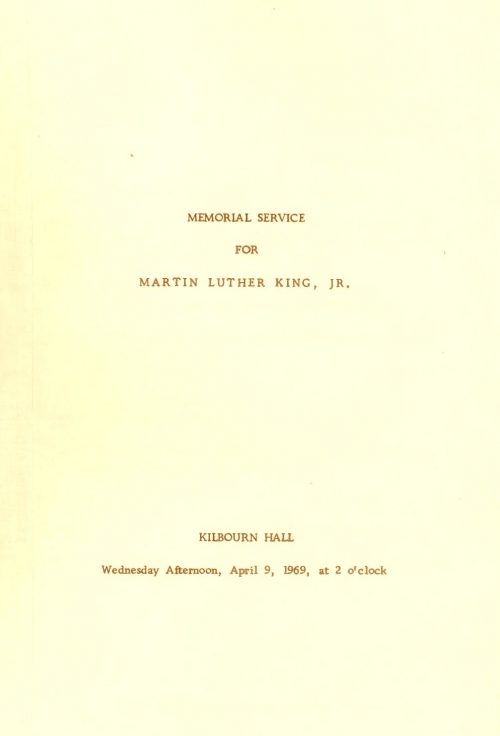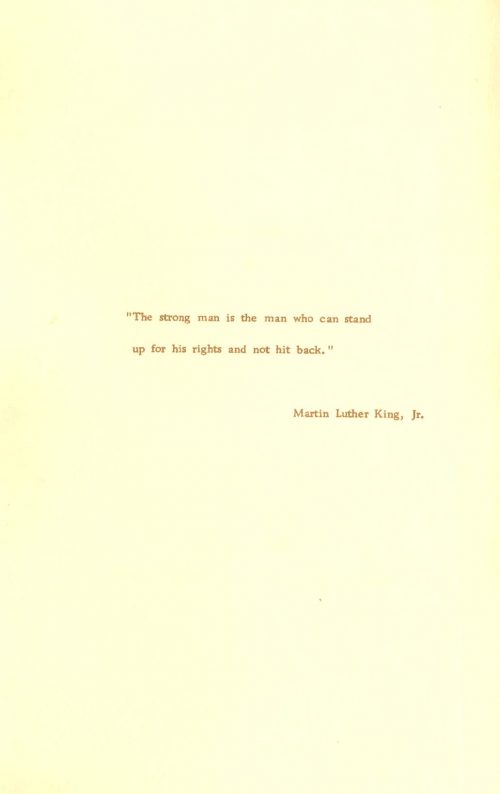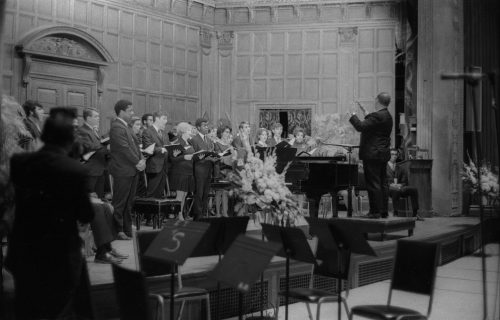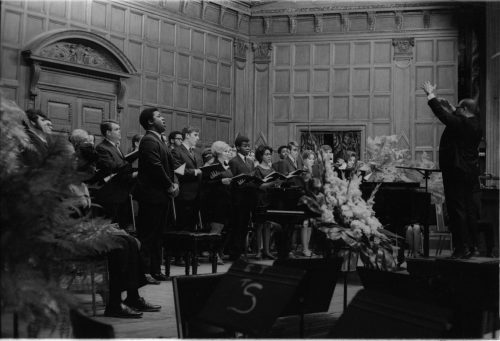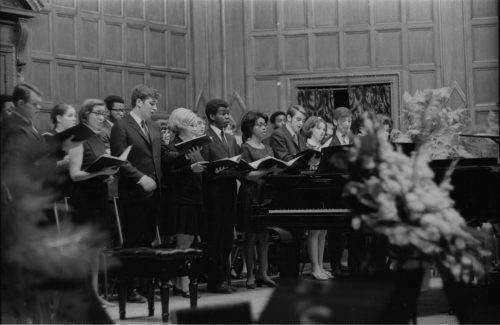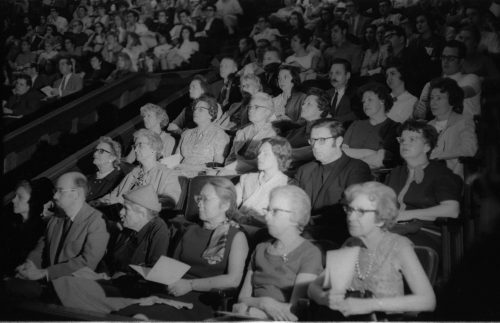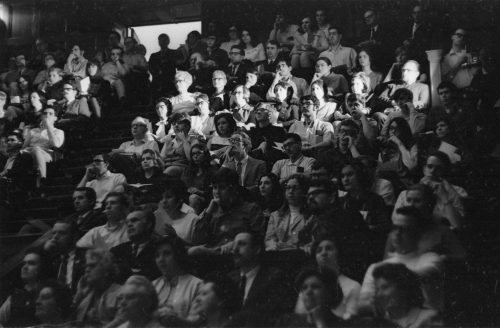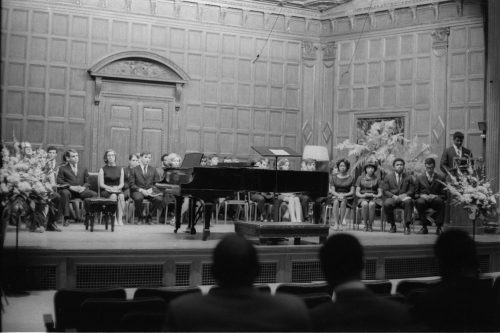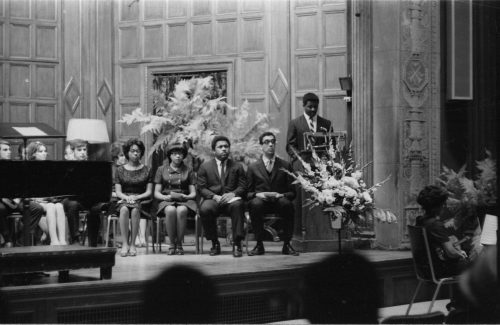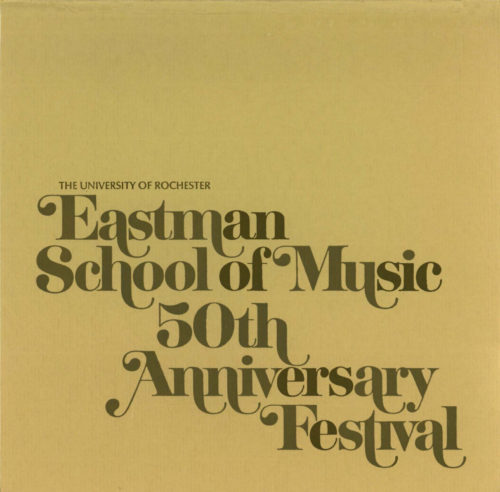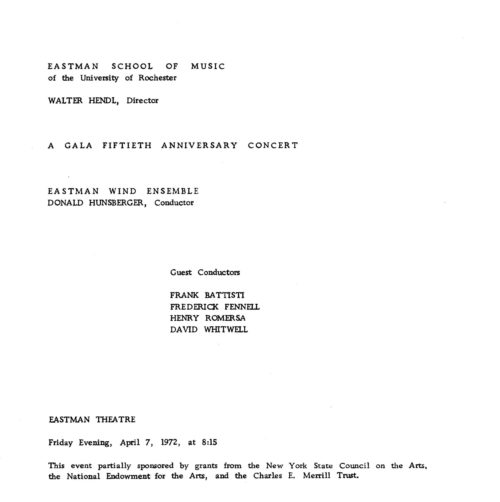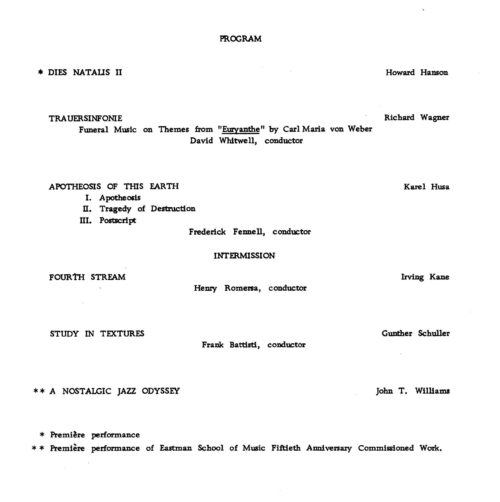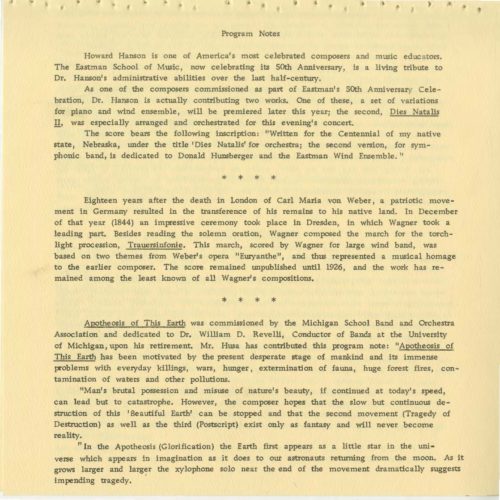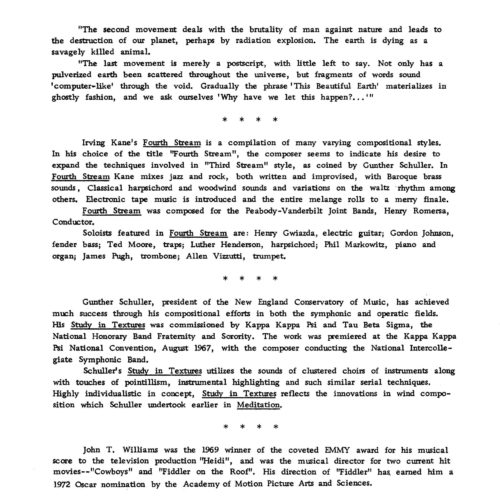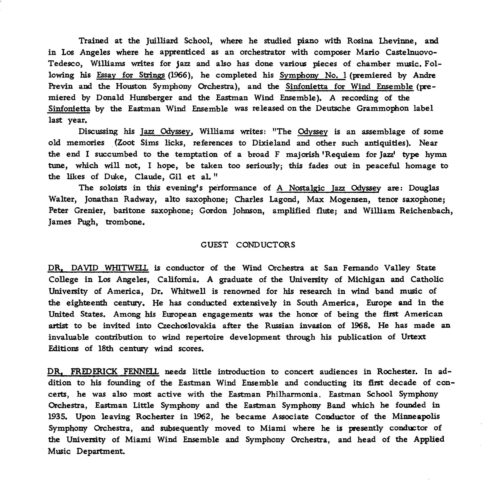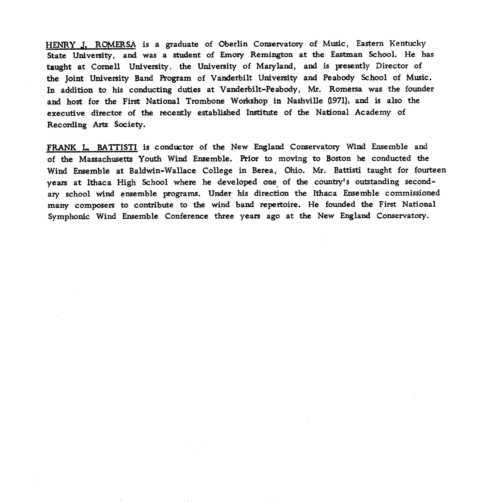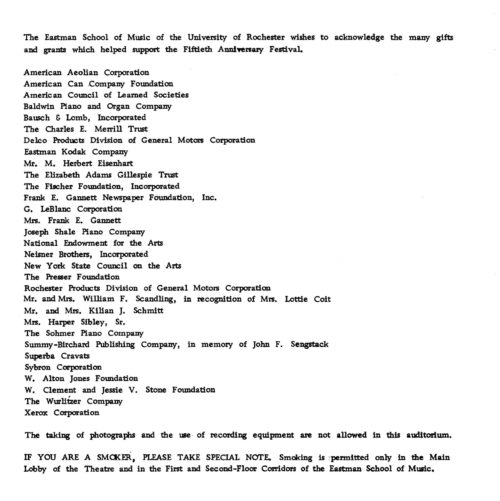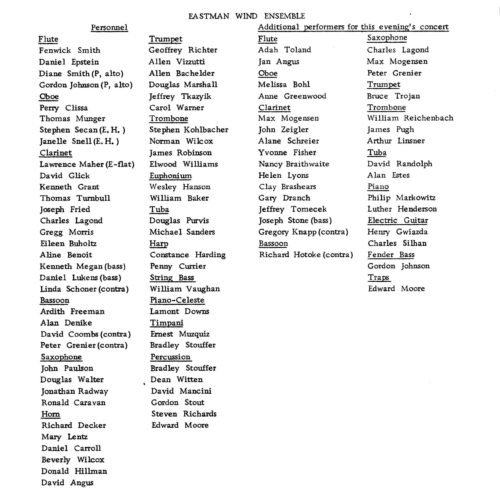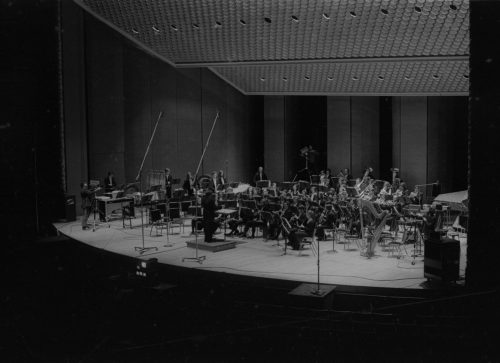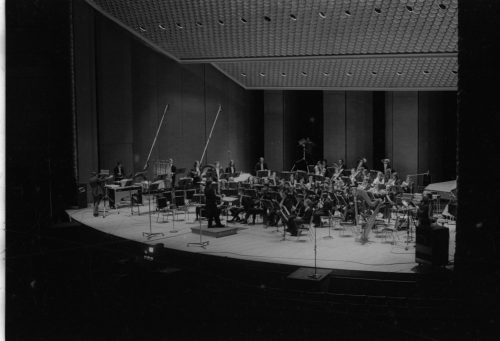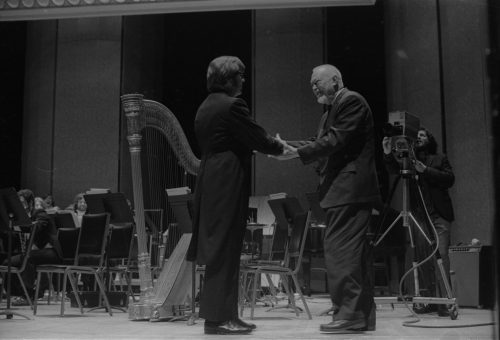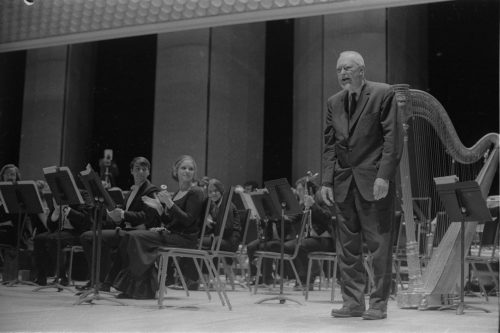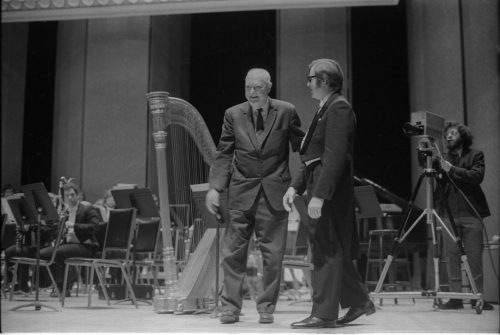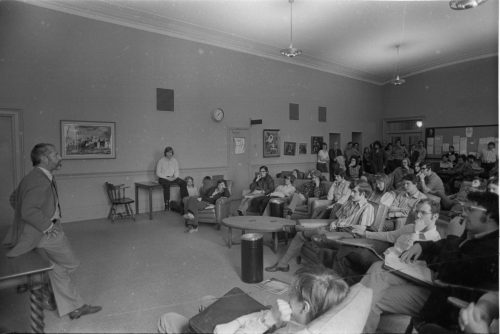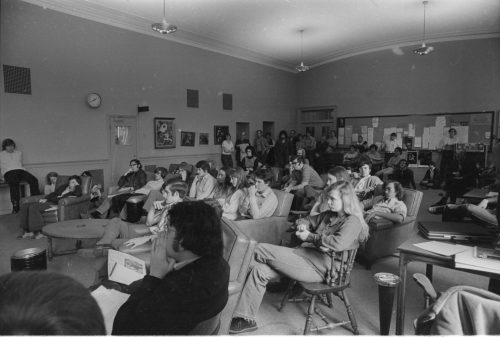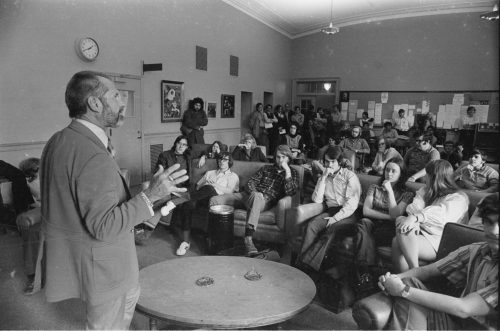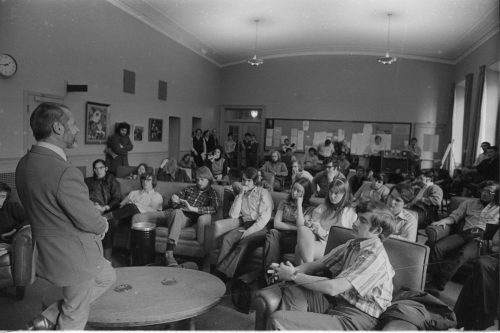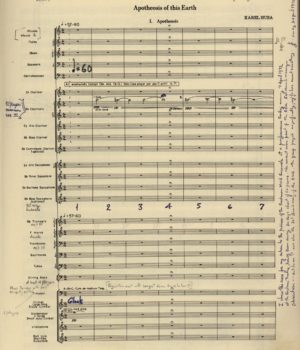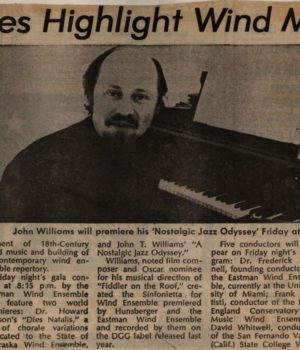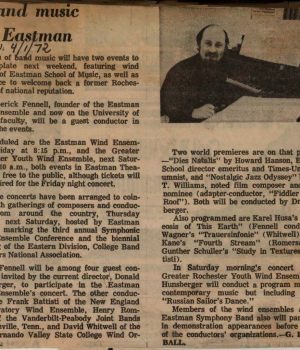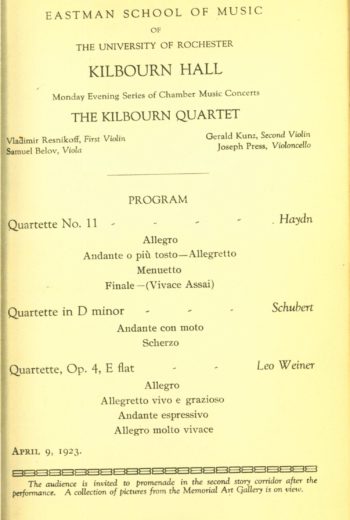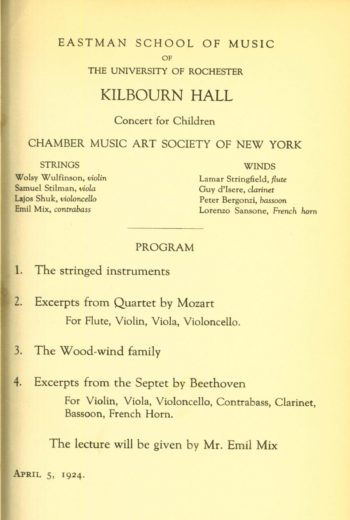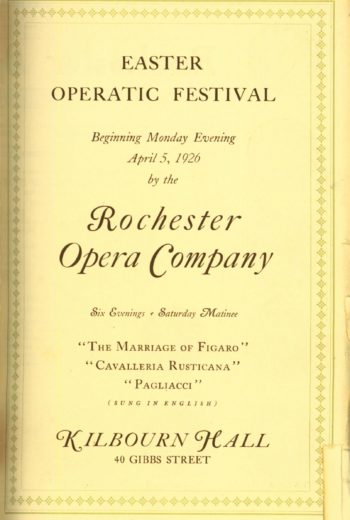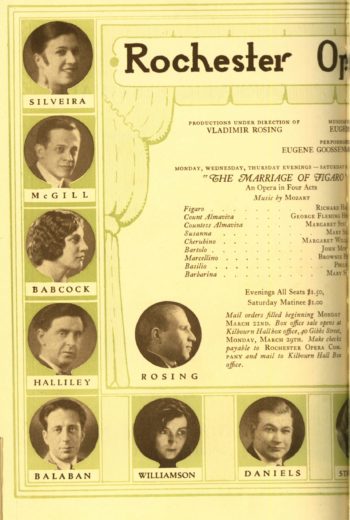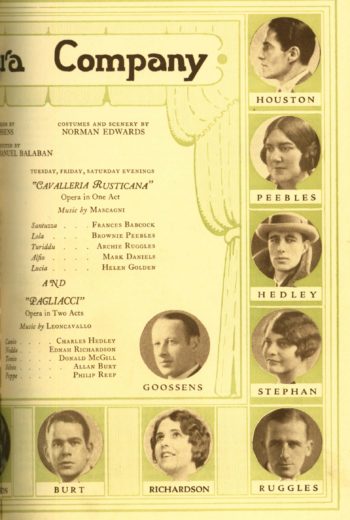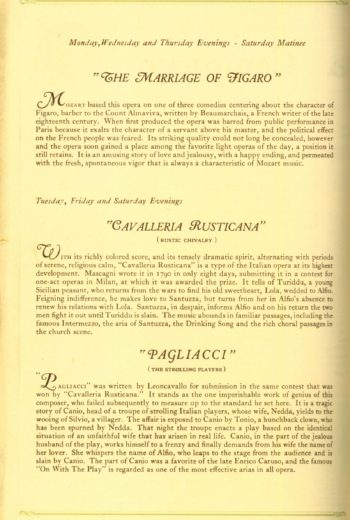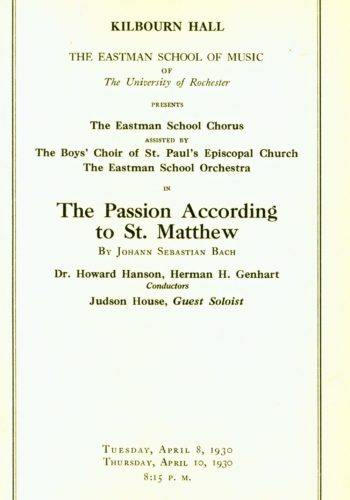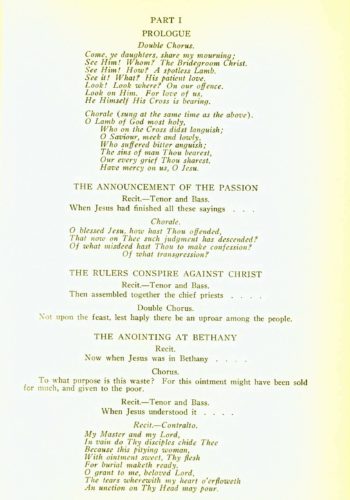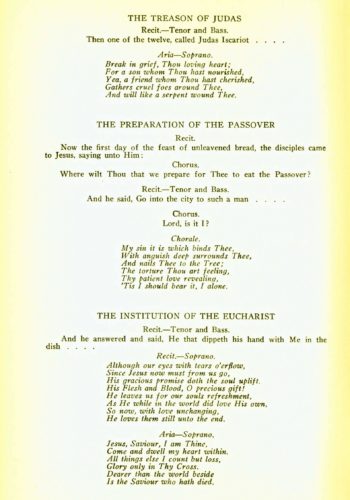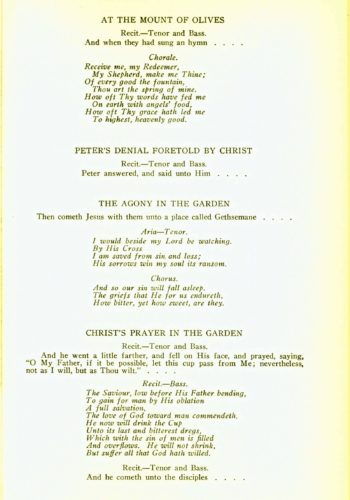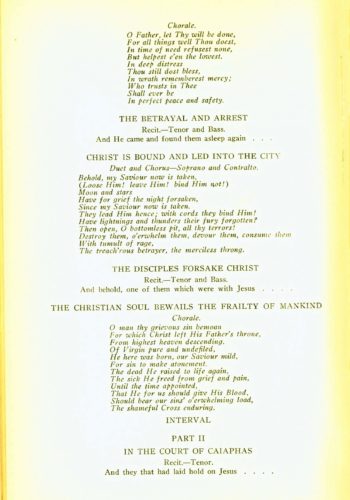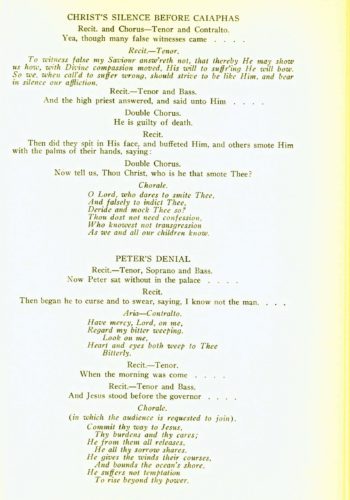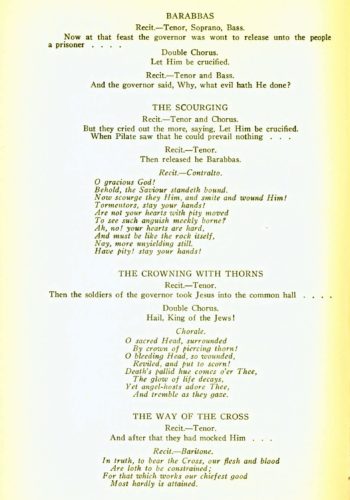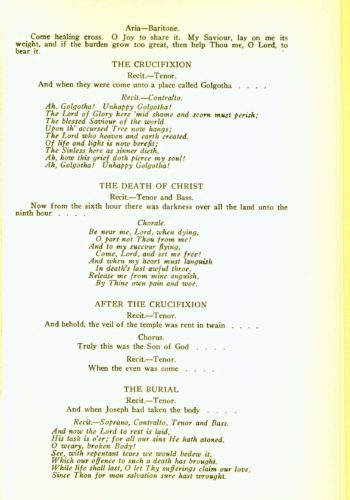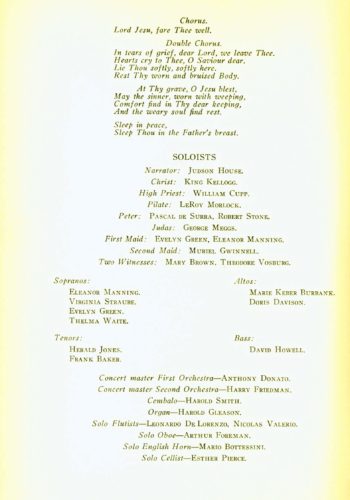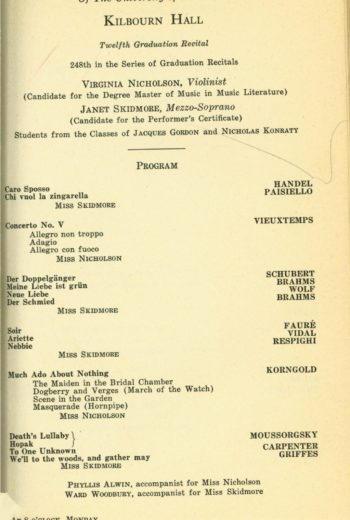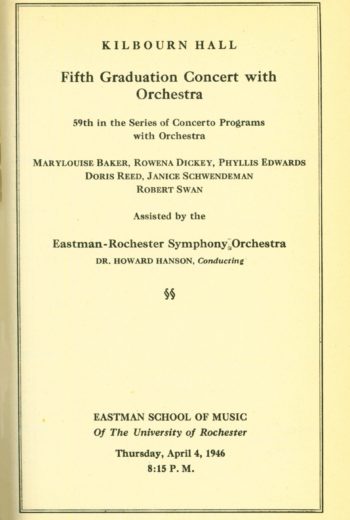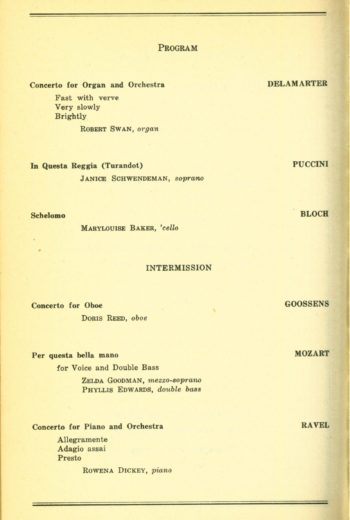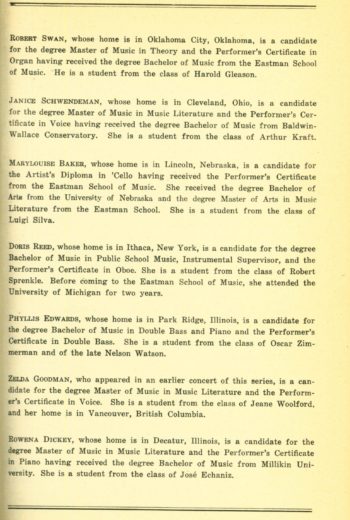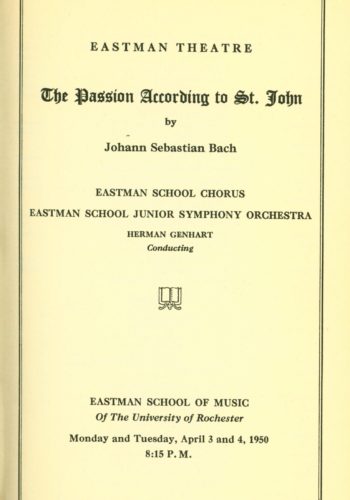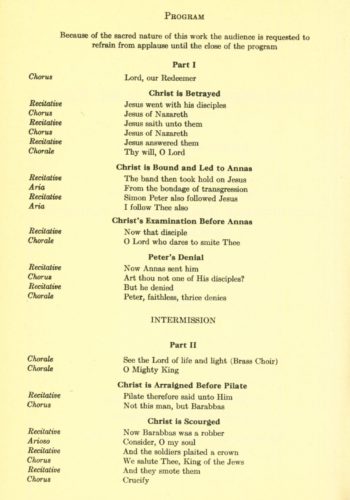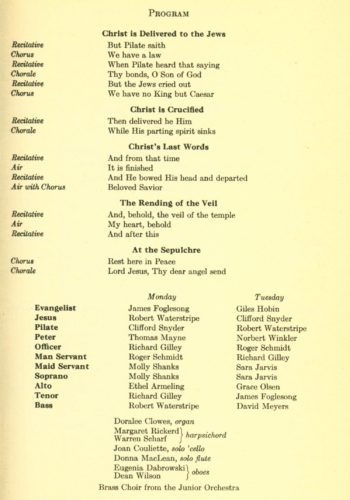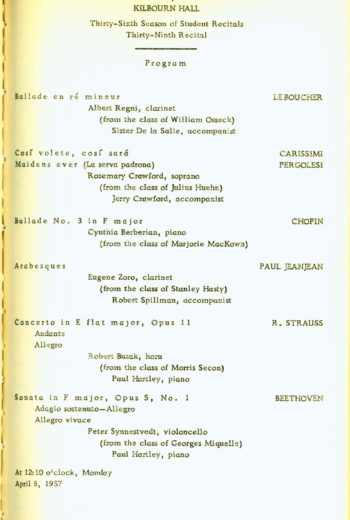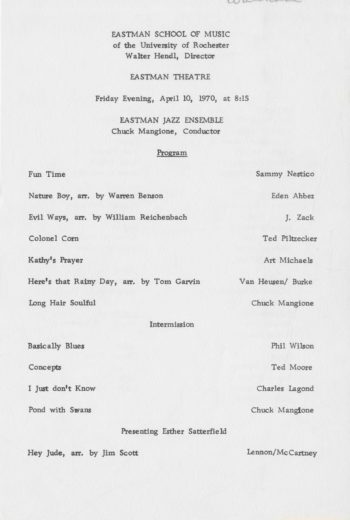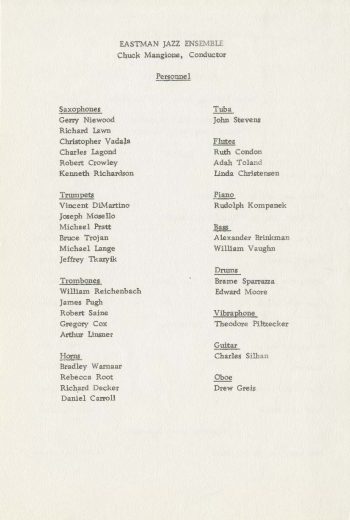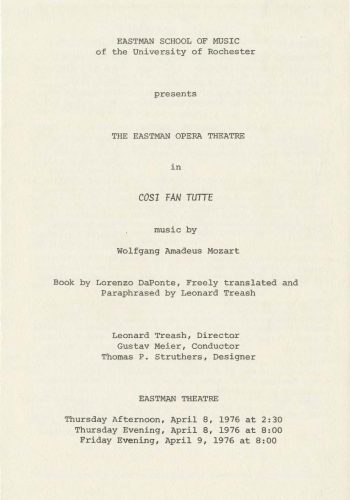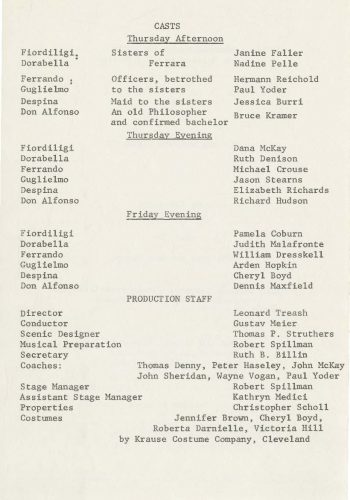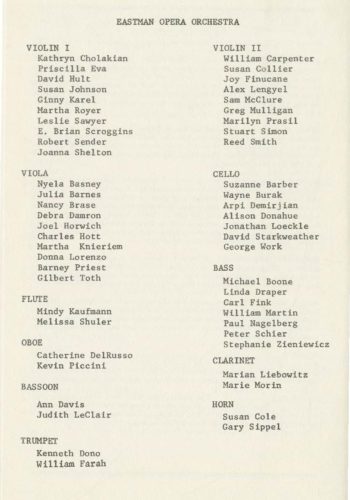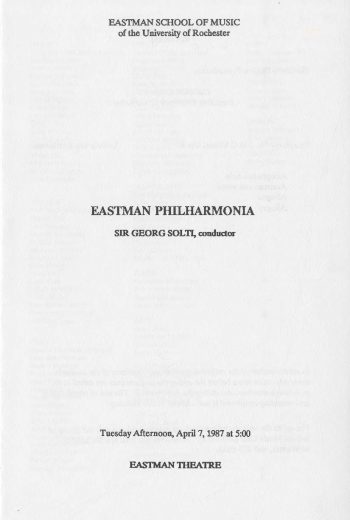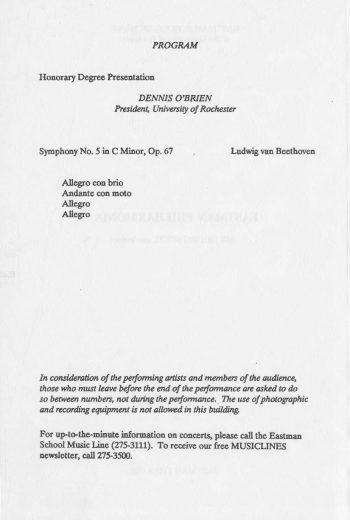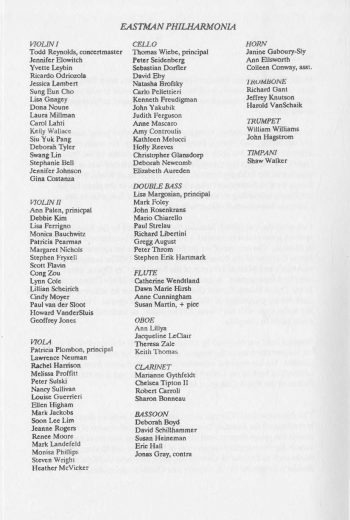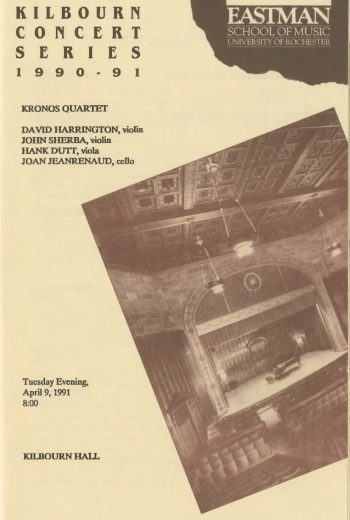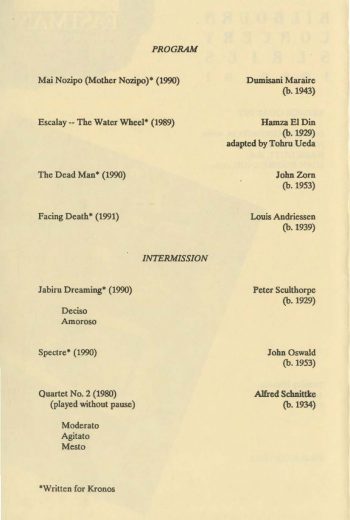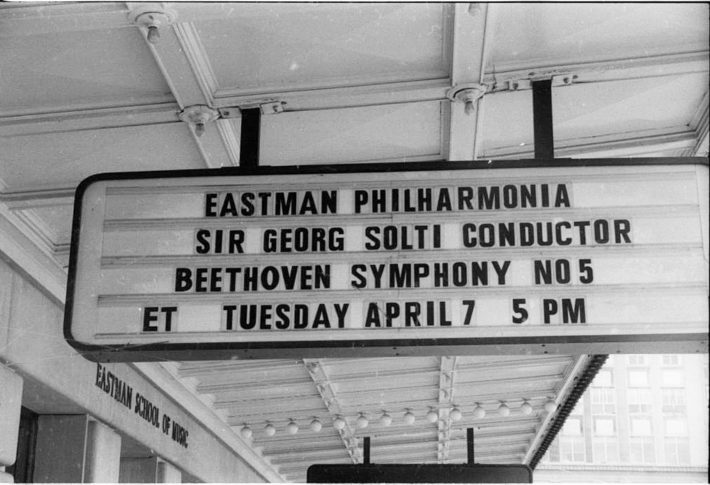Published on Apr 4th, 2022
1969: Memorial service for Dr. Martin Luther King, Jr
Fifty-three years ago this week, Director Walter Hendl called an all-School Convocation for a special memorial service honoring the late Dr. Martin Luther King, Jr. (1929-1968), iconic civil rights leader and Nobel Peace Prize laureate. The memorial was held in Kilbourn Hall on the afternoon of Wednesday, April 9th, 1969, one year to the day after Dr. King’s funeral. As history has recorded, Dr. King was gunned down in Memphis on April 4th, 1968, one of the most wrenching events of the turbulent decade of the ‘60s; his murder was met by widespread protests and demonstrations of varying intensity, and also with memorial services marked by music, prayer and/or reflection, and the spoken word. On the day of Dr. King’s funeral in 1968, a group of Eastman students, specifically the students of color who were enrolled at that time (17 in number), mounted a memorial event in Kilbourn Hall, a memorial presented entirely on their initiative. One year later, the notion of a memorial service was broadly endorsed with participation from throughout the Eastman School; on the day, Eastman students were joined on the stage of Kilbourn Hall by members of the faculty and administration.
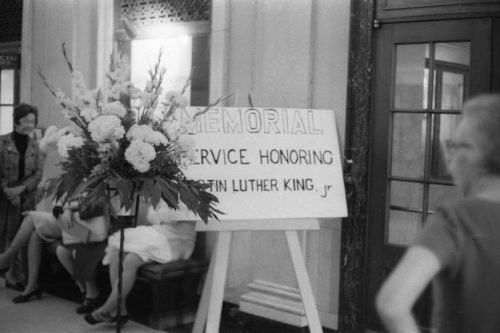
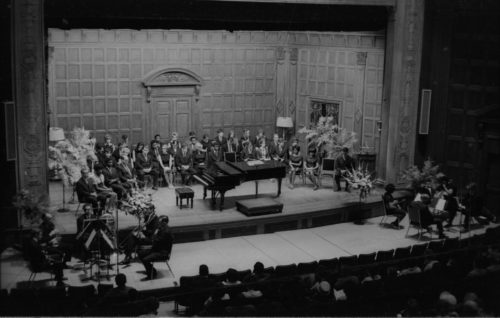
The memorial service began with a prelude consisting of three selections, performed by the Eastman Trombone Choir under Professor Emory Remington’s direction (for whatever reason, the Eastman Trombone Choir was not acknowledged in the printed program). Two speakers then followed: William Crimm, BM ’71 and vice-president of the 1969-70 sophomore class, who gave the opening invocation; and Joseph Bias, MM ’72, who spoke on the event’s purpose, which was to set an example of good will in the commemoration of Dr. King’s death, contrasting with the scattered acts of violence being committed elsewhere. Two speakers in turn recounted Dr. King’s life; they were Connie Jones, BM ’71, speaking on Dr. King’s childhood, education, and early ministry, and Mary Henderson, BM ’70, speaking on his fight for social justice. The Eastman Chorale performed two spirituals under Professor Milford Fargo’s direction: “Where Shall I Be?” with baritone Joseph Bias as soloist, and “Ezekiel Saw De Wheel” with tenor Stanley Cornett, BM ’74, MM ’75 as soloist. A work specially composed by Walter Hendl for this event, Elegy for Martin Luther King, Jr., was performed by a string quartet of four students—violinists David Arenz, BM ’69 and Sylvia Gholson, BM ’68, MM ’70; violist Richard Field, BM ’69; and violoncellist Terry Thomas, BM ’72. Soprano Esther Satterfield, BM ’71[1], sang the hymn “Precious Lord, Take My Hand”—an acknowledged favorite of Dr. King’s—with piano accompaniment (as it happened, the pianist was not acknowledged in the printed program). The Eastman Brass Quintet performed Thomas Weelkes’ “Death Hath Deprived Me” in a transcription by one of its members, Professor Verne Reynolds. Finally, Director Hendl offered some remarks to the assembly by telephone hook-up from out of town, where he was fulfilling a professional engagement, and the event was concluded by the communal singing of “We Shall Overcome” led by the members of the Eastman Chorale.
For three of the student participants, the memorial held meaningful associations with memorials held on the day of Dr. King’s funeral in 1968. Soprano Esther Satterfield had performed at the 1968 memorial in Kilbourn Hall, and also at that event, Paul Burgett—at that time president of the Student Association—had been the principal speaker to eulogize Dr. King. Baritone Joseph Bias had been a senior at Morehouse College in Atlanta (Dr. King’s own alma mater) in the spring of 1968, had been one of the soloists at that institution’s funeral service for Dr. King.
The memorial service received mention in the Eastman School’s 1969 yearbook,[2] and was reported in the Eastman School’s journal Notes from Eastman[3] (forerunner to today’s Eastman Notes) and in the Rochester press[4]. A recording engineer working under direction of the Eastman School’s office of Recording Arts and Services (forerunner of today’s office of Technology and Media Production) recorded the service, and the master tapes were archived; in a short time, the digital transfer from the master tapes will be streamed via the Ampache interface here. An archive is, above all, the preservation of memory, and I would like to believe that a recording of the 1968 memorial is also extant, although as of this writing I cannot confirm as much. To listen to such a recording might well be devastating; I myself cannot imagine the sense of loss, indeed of desolation and despair, that those students must have experienced in the wake of Dr. King’s murder, but their gesture in Kilbourn Hall must surely have signified a spirit of hope. And, too, the Eastman School’s rallying together in April, 1969 sent a positive message. For us today, when segments of our nation have at long last embarked on a national reckoning, and have begun to examine honestly the crimes and inhumanity that informed our colonial heritage and our national origins and that have persisted throughout our history, we can take courage in that the Eastman School paused to pay homage to a great man in a spirit of woke inspiration.
► Photos by Louis Ouzer:
Members of the Eastman Chorale on-stage in Kilbourn Hall, conducted by Professor Milford Fargo. In the first two shots, baritone Joseph Bias (not holding a score) is the soloist. ► R582-12, R582-17, R583-13A
Two shots of audience members in Kilbourn Hall during the memorial service. Students, faculty members, and local citizens were all gathered together. ► R582-13 and R583-15A
At right are the speakers at the memorial service for Dr. Martin Luther King, Jr. on April 9th, 1969. William Crimm is standing at the lectern; seated to his right, from right to left, are Paul Burgett, Joseph Bias, Connie Jones, and Mary Henderson.► R582-11 and R583-8A
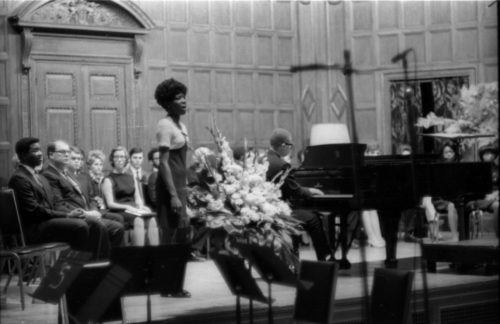
[1] Esther Satterfield’s senior portrait appeared in the 1970 yearbook, but her name is cited as a BM degree recipient in the University’s 1971 Commencement Bulletin.
[2] The Score 1969, page [107]. This issue is digitally accessible (together with all of the Eastman School’s yearbooks published since 1925) at the homepage of the University of Rochester Libraries Digital Collections.
[3] “Martin Luther King memorial service” in Notes from Eastman, vol. III, no. 3 (June, 1969), page 20.
[4] “Dr. King remembered in words and music” by George H. Kimball in the Rochester Times-Union, April 10, 1969. Preserved in Rochester Scrapbook March-May 1969, page 46. Sibley Music Library.
1972: Eastman Wind Ensemble Gala Concert during the Eastman School’s 50th Anniversary
Fifty years ago this week, on Friday, April 7th, 1972, the Eastman Wind Ensemble gave a gala concert under the auspices of the Eastman School’s Fiftieth Anniversary Festival (1971-72). The concert united several interests and milestones, including two premieres, a renewed recognition of Howard Hanson in his retirement, a professional conference in promotion of the wind ensemble concept, and appearances by several guest conductors, including Eastman’s own Frederick Fennell.
The concert was given in combination with a joint meeting in Rochester of the Eastern Division of the College Band Directors National Association (CBDNA) and the Third National Wind Ensemble Conference. The National Wind Ensemble Conference had been inaugurated in 1970 to serve as a national forum for the continuing discussion of the wind ensemble concept while providing a gathering place for conductors, composers, and performers. At each of the annual conferences, exposure was given to a specific aspect of the repertory being performed on a regular basis by leading wind ensembles around the nation. At the 1972 conference, there were two concerts (one in Kilbourn Hall and the other in the Eastman Theater) to focus on music for the orchestra wind section and the chamber wind ensemble, and on the piano concerto with wind accompaniment. The conference’s performance highlight was the April 7th concert in the Eastman Theater that brought guest conductors David Whitwell, Frederick Fennell, Henry Romersa, and Frank Battisti to the podium.
Donald Hunsberger conducting the Eastman Wind Ensemble in concert in the Eastman Theater, April 7th, 1972. ► R1486-26A, -27A
Howard Hanson greets Donald Hunsberger and acknowledges the audience’s applause on the occasion of the Eastman Wind Ensemble’s premiere performance of his Dies Natalis II, April 7th, 1972.► R1489-29A, R1489-31A, R1489-33A
The April 7th concert was noteworthy for the two works that were premiered that evening, the first of which was by Eastman’s Howard Hanson. In 1967 Dr. Hanson had composed his orchestral work Dies Natalis to mark the centennial of his native state of Nebraska, but for whatever reason(s) or circumstance(s) the work did not gain much traction, nor was it published at that time. In 1970 Dr. Hanson re-scored the composition for symphonic band (or wind ensemble), re-naming it Dies Natalis II, and dedicating this new version to Donald Hunsberger and the Eastman Wind Ensemble. This new version was published by Carl Fischer in 1973 under the title Dies Natalis. Since its 1972 premiere it has remained in the EWE’s active repertory.
The other work premiered by the EWE that evening had been a special commission for the Eastman School’s 50th anniversary. John T. Williams (b 1932) was at that time a composer and conductor enjoying a reputation for his work in film and television. In his early years in Hollywood he had performed in film scores by such composers as Elmer Bernstein, Leonard Bernstein, Jerry Goldsmith, and Henry Mancini; throughout the 1960s he had composed for several television series; he had received his first Academy Award nomination for his score for Valley of the Dolls (1967); had received a second nomination for his score for Goodbye, Mr. Chips (1969); and then had won his first Academy Award for his score adaptation for the feature film Fiddler on the Roof (1971). In the spring of 1969 the Eastman Wind Ensemble had twice performed his Sinfonietta, and then had recorded the work for Deutsche Grammophon the following year. In 1971 the Eastman School commissioned a new work from him specifically for the EWE. The result was A Nostalgic Jazz Odyssey, a 17-minute work whose “nostalgic” associations are explained by the composer in the program notes (the printed program displayed here). As it happened, Mr. Williams was unable to attend the April 7th premiere performance owing to his contractual obligations elsewhere with film work. He would enjoy further film successes in the 1970s, and in 1977 his score for George Lucas’ feature film Stars Wars—for which he would also conduct the score with the London Symphony Orchestra—would send his already healthy reputation into the proverbial stratosphere.
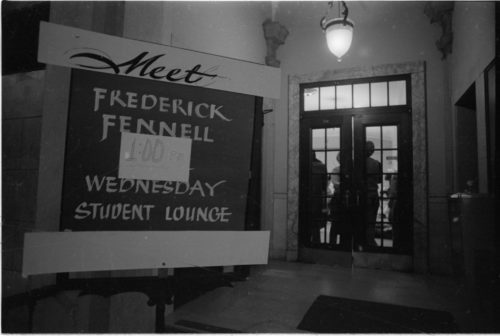
During the joint conference of the CBDNA and the National Wind Ensemble Conference in Rochester, Frederick Fennell met informally with Eastman School students on the afternoon of April 5th, 1972. Two days later he would make a guest conducting appearance with the ensemble that he had founded twenty years earlier. ► R1490-12A, R1490-1A, R1490-4A, R1490-7A, R1490-11A
The April 7th, 1972 concert also marked Frederick Fennell’s first return engagement at the Eastman School since his resignation from the ESM faculty in 1962. For the concert he chose the imposing work Apotheosis of This Earth by Karel Husa (1921-2016), a composer who has been a close colleague and friend of each Eastman Wind Ensemble conductor since Fennell, and several of whose works are firmly in the EWE’s active repertory. Since 2016 the Sibley Music Library has held Dr. Husa’s manuscripts and professional papers. Maestro Fennell penned a personal note on the first page of his copy of the score:
“I chose this score for my return to the podium of the Eastman Wind Ensemble at a performance Friday evening 7 April 1972 at the Eastman Theater, having been away 30 days short of 10 years. The concert was part of the ESM 50th Anniversary celebration — and to me, it was also the 20th Anniversary of the EWE. The group played magnificently; my life has meant something. FF Sunday 9 April 1972”
The Weekly Dozen
In this week’s “The Weekly Dozen” we recognize one of the performances by Eastman’s ever-creative opera-in-English troupe, the Rochester American Opera Company; a prestigious guest appearance by Sir Georg Solti with the Eastman Philharmonia; a guest appearance by the Kronos Quartet, renowned chamber ensemble that would later welcome an Eastman School alumnus as a member for eight seasons; the valedictory operatic production directed by Leonard Treash, marking the end of an opera for Eastman Opera; and finally, some superlative student performances such as grace the Eastman concert calendar each week of the semester.
►April 8-9, 1976
►April 7, 1987
►April 9, 1991


